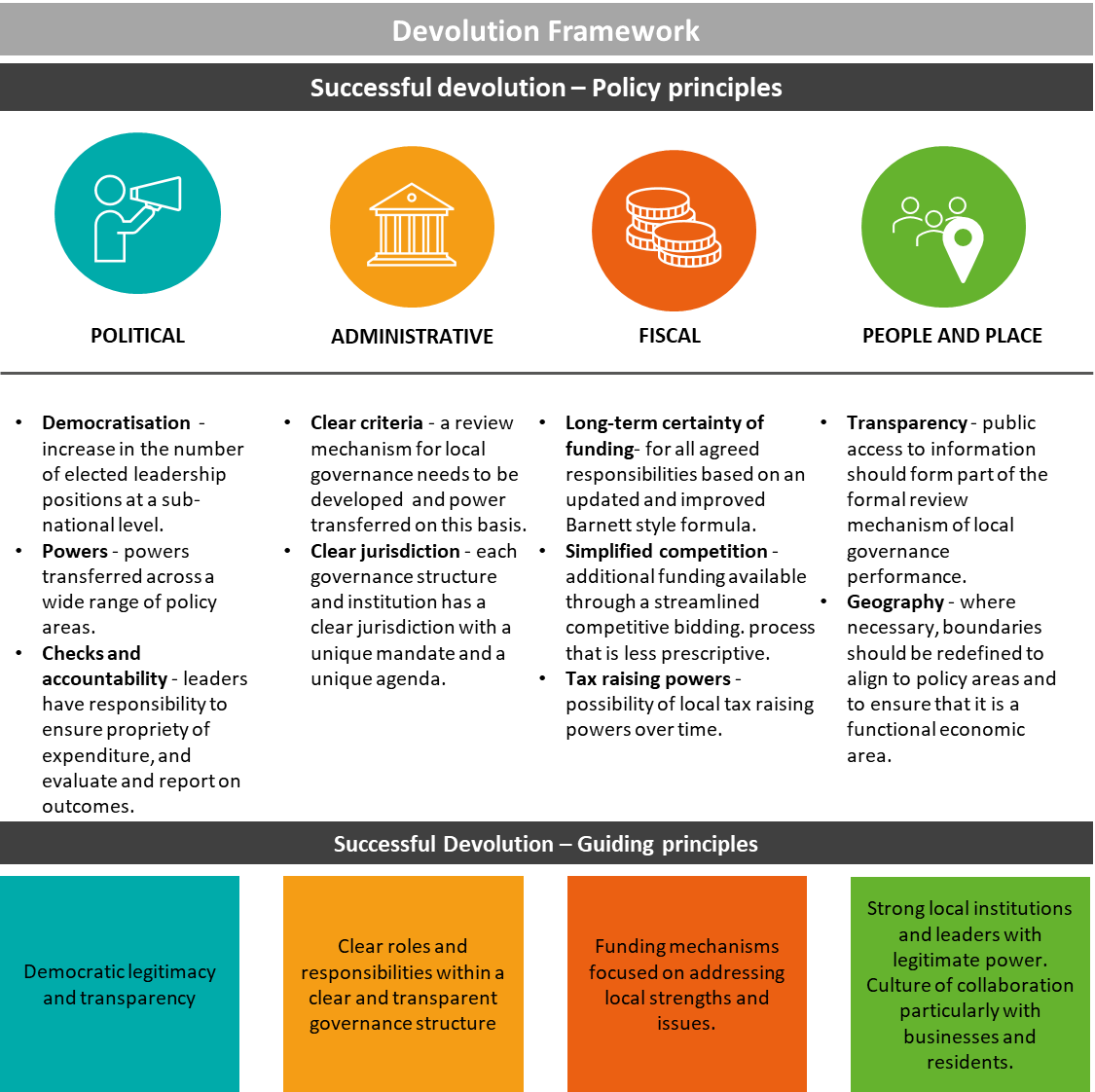Devolution and Governance in the UK: A Multi-Scalar Solution to the UK’s Regional Productivity Gap
This blog written by Martin Quinn presents the key findings from a report on Devolution and Governance Structures in the UK (2021), from the recently disbanded Industrial Strategy Council. The Productivity Institute is pleased to host this blog which provides input for TPI’s research agenda, in particular its research theme Institutions and Governance. The report was written by Amy Regan, Martin Quinn, Anna Romaniuk, Sky Sampson, Tom Stratton, Abigail Taylor and Ben Brittain.
The UK’s productivity puzzle has received much attention over the past few years. However, this is not merely a national economic issue. As work by McCann (2016) has shown, the UK is also one of the most inter-regionally unequal countries in the industrialised world. There are significant and persistent income and productivity gaps between the regions and devolved administrations of the UK. London outperforms the rest of the UK economy by a significant margin and the economic indicators produced by the capital, London, heavily skew the national picture. Addressing the UK’s productivity puzzle will require regional and local as well as national solutions (van Ark and Venables 2020).
The final research report by the recently disbanded Industrial Strategy Council focused on the issue of devolution and governance in the UK. It is widely recognised that the UK remains one of the most politically and fiscally centralised large countries in the developed world. Based on two years of research, the Council’s 2021 Annual Report argued that devolution of spending and decision-making powers is an essential tool for ‘levelling up’. The final research report presented a devolution framework for ambitious and effective devolution and argues that this will help unlock the potential of regions across the UK.
UK’s lack of clear long-term vision
The UK has had a tendency to switch between advances and reversals in decentralisation policy. As governments have changed so has the geographic focus, be it regional, county, city regional, or the current combined authorities. In addition, policies regarding sub-national governance have been carried out in a piecemeal manner rather than as coherent strategies. The result of this is a local institutional landscape that is confusing and fragmented.
The lack of a clear, long-term, coherent vision for sub-national policy is problematic for local institutions as they have to continuously adapt and change direction. Some regions have proven to be more adept at doing this, and this has exacerbated geographical inequalities as those regions with the capacity to adapt have been more successful at bidding for the competitive pots of money provided by central government.
For the report, the Council undertook substantial primary research into devolution and governance structures across the UK. The report aimed to draw lessons from how local institutions work together to drive policy implementation, which structures seem to work best, and gauge appetite for greater devolution.
The findings show that the ‘chaotic’ approach to devolution and governance has, unsurprisingly, left behind a range of institutions and partnerships across the UK that work at differing scales in different places. Rather than propose yet another wholesale attempt at restructuring the sub-national tier, the report argues for a multi-scalar approach to devolution and governance. This would allow areas where successful partnerships are already in place to flourish, whilst providing support and capacity building for those areas yet to establish governance structures.
The report develops a framework which grouped the key findings into four pillars as follows: Political; Administrative; Fiscal, and People and Place. The report distilled these findings into a devolution framework (see Figure One below) designed to provide a structure and set of principles that can survive changes of national government and ensure some continuity for the devolution process.
The framework contains two parts: policy principles and guiding principles. The policy principles are tangible, actionable evidence-based recommendations, which should inform central government policy officials on the creation of devolution policy. The guiding principles should be used by both central and local leaders and are a set of behaviours, which should be embodied by those who work with, or in, sub-national governance structures. Taken together, they provide a basis for long-term devolution and governance solutions for the UK.
Figure 1: Policy and guiding Principles for Devolution and Governance

Implementing Devolution
The Council recognises, and agrees with, the argument that devolution is a process and not an event. It requires staged implementation with room to innovate, test and adapt. This research demonstrates that there is no optimal level at which to implement devolution in the UK.
Therefore, we propose a multi-scalar model which allows for the flexible transfer of powers and decision-making capacity between levels. The multi-scalar model is designed to be flexible and iterative. The suggested starting point for a multi-scalar model would be to devolve powers and fiscal responsibilities to the existing devolved administrations and the nine English regions used for the Regional Development Agencies (RDAs). Further devolution could then flow from the regional tier to smaller areas (such as those currently represented by a Mayoral Combined Authority or Local Enterprise Partnership) as and when they meet agreed criteria.
For powers and funding to flow down further to smaller functional areas, those areas must have the capacity to deliver. Previous Council research has shown capacity is variable at the sub-national level in England. Local areas would need to meet a set of pre-established criteria for powers to be transferred. Areas that did not meet these criteria would remain under the remit of the larger sub-national unit.
Criteria for devolution to smaller functional areas might include:
- Binding commitments to collaborative working and power sharing from local authorities, business networks and significant institutions such as community groups and higher and further education.
- Evidence that it is a functional economic area (also referred to as economic functionality) such as travel to work areas, existence of a chamber of commerce, existing infrastructure, supply chain access.
- Clear governance structures with agreed roles and responsibilities.
Devolution could take place through measures such as the creation of new economic and strategic institutions, establishing new elected leadership positions, guaranteed levels of fiscal devolution, and granting of decision-making powers including spending, infrastructure, and planning. The report was designed as a starting point for a research agenda to address the uneven economic outcomes in the UK. Following on from our suggested framework for devolution and governance, research is needed to identify how any sub-national arrangements could then start to address the productivity gaps in the economy through increasing skills, innovation and economic growth across the UK economy.
The full report is written by Amy Regan, Martin Quinn, Anna Romaniuk, Skye Sampson and Tom Stratton from the Industrial Strategy Council together with Abigail Taylor and Ben Brittain from WM-REDI.



